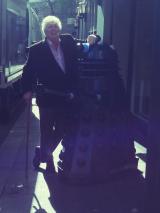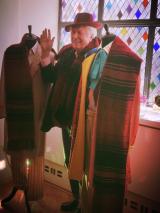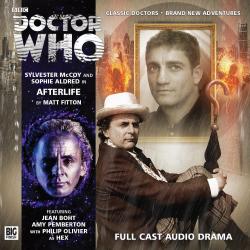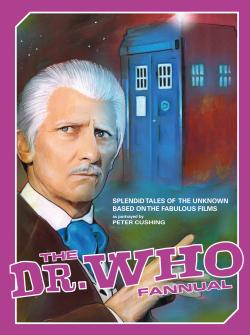White Ghosts (Big Finish)
Sunday, 20 April 2014 - Reviewed by Matt Hills
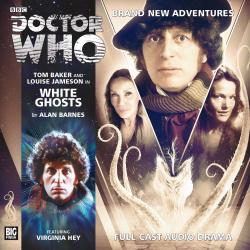
White Ghosts
Produced by Big Finish
Written by Alan Barnes
Directed by Nicholas Briggs
Released: February 2014
However, learning isn’t a wholly positive force in this story. Leela’s acknowledgement – “thank you, Doctor, for my education”, she says at one point – is contrasted with the academic culture encountered by the time-travellers. “Senior Tutor” Bengel and her “research assistants” are busy researching an extremely unusual planet where darkness endures almost constantly. Modified by injections so as to operate in the dark, these boggly-eyed scholars are investigating the “white ghosts” of the title: savagely sentient plants that grow at an accelerated rate when exposed to light. But this isn’t an idealistic pursuit of knowledge. Instead, the team of researchers aim to exploit their discoveries, vying dangerously with one another for status.
The Doctor coins a nickname for one of this scholarly team (performed very effectively by Bethan Walker from the Torchwood episode ‘Cyberwoman’), addressing her as “star pupil”. Elsewhere this might be a compliment, but in this case it eventually takes on a bleakly ironic tone. Meanwhile, the Senior Tutor is voiced by Virginia Hey, crossing from one SF franchise to another, and playing her role with all the conviction and authority that it requires.
For most of its running time this is a taut and compelling creation, veering into the territory of vampire mythology. But the story’s resolution is perhaps slightly hamfisted, depending on an impromptu and convenient spot of time-travelling while the Doctor and Leela are separated from the TARDIS. More intriguingly, the events of ‘King of Sontar’ resonate here in ways that run beyond Leela’s learning. The mythos introduced in ‘State of Decay’ is eventually also referenced, and the Time Lords look set to offer a recurring backdrop to this series of stories.
Although the mystery of the “white ghosts” is eventually solved, the story again doubles and bifurcates its pursuit of knowledge, with one discovery being countered by another of a very different nature. It seems that learning can be both good and evil, hopeful and duplicitous, in this world: fairytales don’t quite offer a reliable guide to the darkness at the edge of the universe.
When Leela engages in combat, we hear her ‘inner voice’ or warrior’s consciousness, and the device works extremely well to capture what could otherwise be a highly visual action sequence hamstrung by an audio-only format. It also slows down the action for a scene or two, in a story that is otherwise furiously concerned with acceleration – accelerated growth, accelerated change, and faster-than-light salvation. This counterpoint works exceptionally well, and Alan Barnes’ story is well served by Nick Briggs’ direction both here and throughout.
Tom Baker’s hilarious delivery of another incarnation’s catchphrase has to be heard to be believed. And there are other aural treats: occasional music cues sound vaguely reminiscent of The Hitchhiker’s Guide to the Galaxy to me, but this isn’t a Douglas Adams-esque romp, coming across instead as a tough SF-vampire thriller. There’s no sparkling in the light in this brand of hard-edged fantasy, and just as the Doctor’s response was called into question at the end of ‘King of Sontar’, some of his actions this time around also seem far from ideal. This realisation of the fourth Doctor is a touch less heroic than some of his televised versions, and rather more compromised or doubting, as Tom Baker notes in the extra feature interviews. It’s a fascinating dynamic, off-setting Leela’s growing understanding and literacy with a slightly less God-like, omniscient Doctor who's recurrently pushed to make difficult choices. However much we might strive to improve ourselves, awkward decisions always remain. And the Doctor’s optimism at meeting “people of learning” proves to be largely unfounded; learning is no guarantee of goodness or civility in ‘White Ghosts’. Light and dark may offer black-and-white certainties, but this is seemingly a grey universe, lacking in moral absolutes. Whether you’re a Doctor, a star pupil, or a Senior Tutor, you might not know best.
